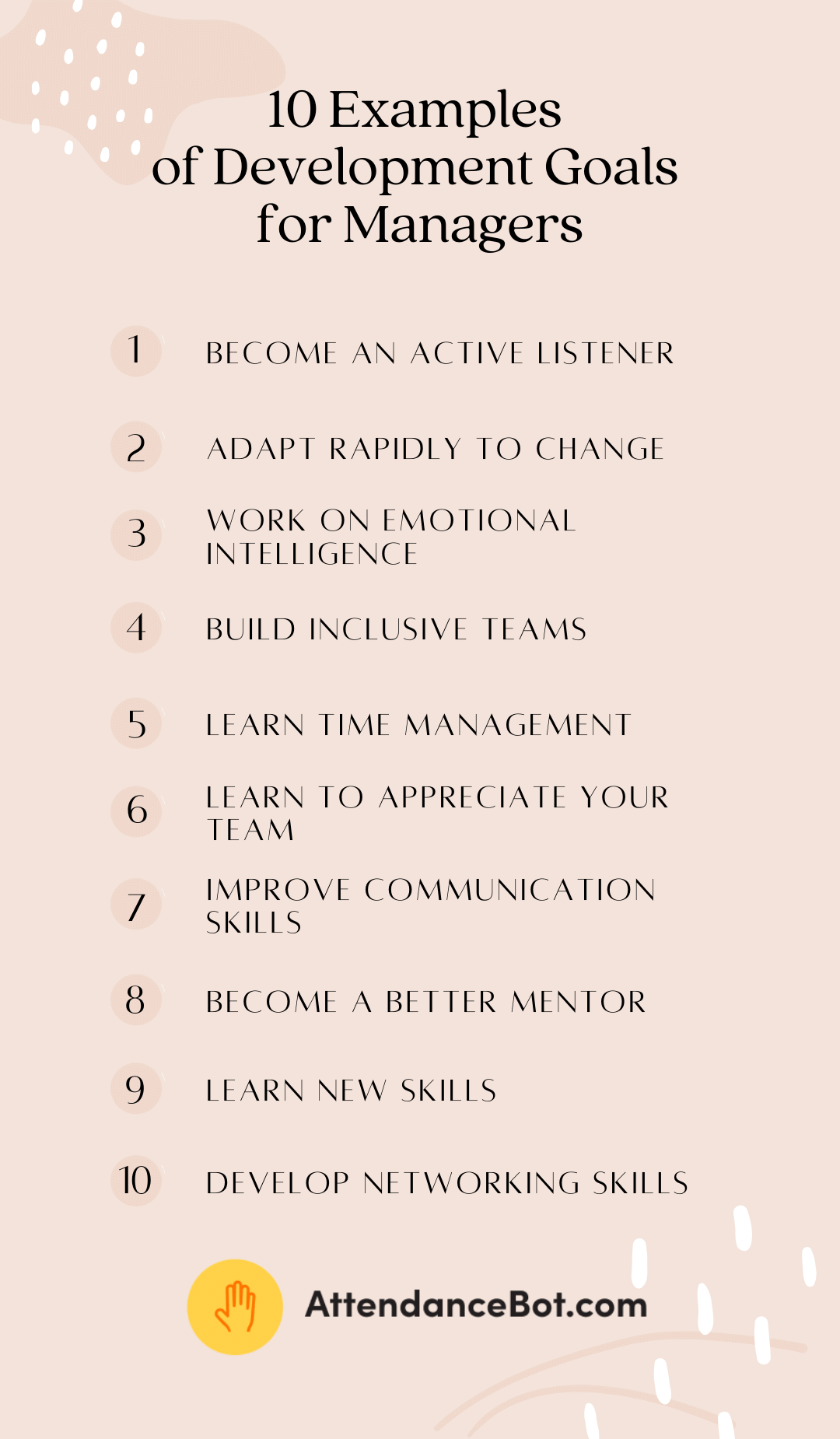In the relentless pursuit of growth, executives often overlook a vital factor: the development for managers. While employees are the lifeblood of any organization, it’s the managers who set the tone, inspire teams, and drive performance. However, what happens when those very managers feel stuck or unfulfilled in their careers? This article delves into the transformative power of development goals for managers, revealing how prioritizing their growth can catalyze a more motivated workforce and foster a culture of continuous improvement. With the right goals in place, managers not only enhance their own skills but also ignite a chain reaction of productivity and engagement across their teams. Ready to explore this win-win strategy? Let’s dive in!
What Are Development Goals for Managers?
Development goals for managers is an initiative to improve and increase competencies through continuous learning and training at the workplace. A development goal could be job-specific such as completing some training and enrolling in some courses. Or it could be more general such as demonstrating a certain behavior at work.
Either way, both sets of goals aim to increase a manager’s competencies, help them grow in their career, and emerge as strong leaders.
How to Make Professional Development Goals for Managers?
Professional development goals for managers are set in collaboration with HR. So once you are sure that you need goals for yourselves, the next step is to define the right goals. Outlining the right goals is important because they will have a domino effect on your team and organization as a whole.
Also, it is not a good idea to replicate the goals of your peers. Because goals that are specific to them may not be important to you. So how do you avoid it?
- Map out your professional and personal journey roughly on a piece of paper: Visualize where do you see yourself professionally and personally. Set some milestones to achieve in the year.
- Evaluate your strengthens and weaknesses: Ask others for feedback for more authentic and accurate results. The evaluation process will give you a fair idea of areas where you need to level up and what you’re already good at. Once this is done, you will be in a better position to set goals for yourself.
- Go all in: Analyze and understand how you can reach your milestones. Set an action plan with definite timelines and keep monitoring your progress.
Nature of the Development Goals for Managers
Now that you know the basic drill of identifying your goals, you should know the nature of these goals. Development goals for managers should be:
Clear
Mangers should have goals that are clear with no ambiguity. Most importantly they should know the why behind pursuing the goal. It will only make the process smoother.
Measurable
Quantifiable goals are easy to achieve and evaluate. When you can easily measure your progress and results, you will feel more confident and accomplished.
Realistic
It’s good to set goals that challenge your competencies. But don’t go overboard with them. Have goals that are challenging yet achievable.
Time-period
Give yourself a deadline. When a goal has a start and finish line, it becomes easier to achieve them. You know when to speed up or slow down.
Rewarded
Rewards can either be extrinsic or intrinsic. Appreciation and recognition on the completion of a goal boosts a manager’s confidence and motivates them for future tasks.
Now, you know what parameters to keep in mind when setting goals for yourself. But, why do we need to do that in the first place? Let’s have a look at some of the benefits.
Why Are Development Goals for Managers Important?
Setting development goals for managers can drive significant growth in leadership capabilities and team performance. For example, focusing on self and team development encourages managers to build strong relationships and effective communication within their teams. Personal and professional goals like ‘improving delegation skills’ or ‘developing coaching techniques’ are essential for managers aiming to empower their team members. Crafting personal development goals for work that align with broader departmental goals also fosters a more cohesive work environment, where managers and teams alike are committed to achieving shared objectives. By defining clear, actionable goals, managers can continuously refine their leadership approach, helping to inspire a culture of growth and excellence.
A leader with goals knows the direction they are headed to. With goals in action, a manager knows what all they need to do for their and the team’s development. Without further ado let’s dive into some of the benefits of setting development goals for managers.
Build Abilities
Let’s begin with an example of an athlete who performs the same workout every day. No doubt they will be able to maintain their current level of fitness but they won’t learn new techniques to get faster or stronger. The same situation applies to a manager. If a manager follows the same routine and doesn’t add new skills to their portfolio, they probably would not be able to adapt to the changing work dynamics. Also, they won’t be able to keep up with the changing needs of employees.
Setting development goals stretches the human mind in different directions in order to continue growing in different ways. The more realistic goals they set for themselves, the more skills they will acquire. As they acquire more skills, they will be able to use new technology, work with different departments and update stale processes.
Stay Aware of Industry Changes
Businesses are evolving at lightning speed with the advent of new technologies and practices. Needless to say, a manager needs to embrace new technologies to keep up with the changes. Managers should be encouraged to expand their knowledge so that they can stay updated with industry trends. A manager with a fixed mindset and obsolete skills does no good to the organization. So, keep adding development goals to your daily workflow.
Increases Engagement
They say that happy employees make happy customers. But what really makes employees happy?
Well, working backward, happy and satisfied managers make productive employees.
Executives in an organization should take interest in the career growth of managers as well. They should encourage them to set goals that assist them in their professional and personal development. This will make managers feel valued and engaged in an organization.
Helps Team Grow
Development goals for managers are important because they help them set their priorities right. When managers set goals with their team in mind, they work towards becoming more efficient leaders. You help your teams grow in their roles and eventually meet the company’s expectations. Managers who are goal-oriented know the direction their team is headed to and reflect more on their performance.
10 Integral Goals for Managers
While all managers can have different goals and priorities, some of the goals that all managers can strive to achieve are discussed below.
Become an Active Listener
This is a must-have attribute for all managers and leaders. A culture where communication is clear is one that thrives well. As a manager, you should consciously work towards becoming a better listener. Listen to every conversation with the intention to understand and empathize rather than just give feedback. When you listen actively to your team, be open to receive positive and negative information.
Showing your willingness to listen to your employees will encourage them to be more vocal with their plans and ideas for the company’s growth. Naturally, employees feel valued and work with greater commitment.
Be Adaptable to Change
Change is and should always be the only constant. Avoid having a know-it-all behavior. Instead, be open to change. Set a goal to learn new things. When you’re adaptable, you are able to run your company efficiently even in hard times.
For example, the Covid-19 pandemic has been nothing less than a roller coaster ride for everyone. Economy and work dynamics have evolved drastically. In such situations, companies have to change their strategies overnight and for that managers should have a mindset for growth and change.
Set goals that make you flexible enough to embrace changes in all aspects be it business operations or resource utilization.
Work on Emotional Intelligence
Not all leaders are born with high EQ but all leaders can definitely develop theirs. EQ has five major components: self-regulation, social awareness, social regulation, motivation, and self-awareness. These traits help a manager make decisions, manage stress, and set appropriate goals.
Build Inclusive Teams
An important goal to take up is to form inclusive teams. An organization thrives well when it hires a diverse set of employees. Diverse employees bring in dynamic skill sets which is what workplaces need nowadays.
The covid-19 pandemic has given us all a reality check and a lesson to be prepared for anything at any time. For instance, the virtual workforce has become a normal phenomenon now. So managers should encourage their teams to be dynamic to be able to manage the transition.

Build Connections
Building networking skills is another important development goal. Working hard in your department will take you up the growth ladder but to some extent only. In order to surpass that point, you must invest time and energy in building healthy relationships with everyone within the company. Set a goal to be more collaborative and cooperative.
Set a goal to attend networking events and represent yourself and your company. It is equally important to have connections within and outside your workplace.

Learn New Skills
No amount of skills are enough. To be able to build your managerial competencies, you should set a goal of learning new skills every now and then. They could either be technical such as learning a programming language or soft skills, for instance developing your non-verbal cues.
Become a Better Mentor and Coach
Good leaders are great mentors as well. Employees look up to them for coaching, counseling, and guidance. Therefore, all managers should make mentorship a priority.
Create development plans for each team member and see how they can grow in their capacity. Work with them to help them identify their career aspirations. Show them that you are there to support them in their personal development by offering them opportunities that challenge them.
Improve Communication
Poor communication hampers productivity so make sure you make this one of the development goals on your list. Enroll yourself in a training program or workshop that guides you on how to be clear and concise with your verbal and non-verbal communication. Remember that a culture that fosters clear and transparent communication thrives.
Learn to Appreciate Your Team
All managers know that employees are a company’s biggest assets. So set a goal to learn to appreciate and reward employees for their big and small achievements. Express gratitude and applaud them for every milestone achieved.
Appreciate your team publicly so that they feel valued. Work consciously on coming up with better employee appreciation programs. Learn new ways of rewarding your employees. Also, appreciate your subordinates for non-work-related stuff as well.
Go through reading resources that can help you come up with different ideas. For instance, you can have funny employee awards to add a flavor of fun and humor to the otherwise boring employee appreciation programs.
Learn Time Management
As a manager, you deal with multiple things in a day and your workload can get overwhelming at times. That is where you need to set a goal for learning time management. This is one of the most important skills for every manager and leader to have. You can either pursue a course or attend a workshop for this purpose. But this isn’t enough. You must practice what you learn.
Implement your learning in your daily routine and be mindful of it because your team follows your behavior. Once you have honed this skill, pass this on to your team and let the whole organization benefit from it.

Final Word on Development Goals For Managers
As a manager, you are responsible to lead people under you. And it is best to lead by example.
Being a leader, you are accountable for what your subordinates do. So, to ensure that people under you perform their best and you enhance your competencies, you have to work on yourself.
By setting development goals for yourself, you are paving a path to success for three entities: your organization, your employees, and yourself.





